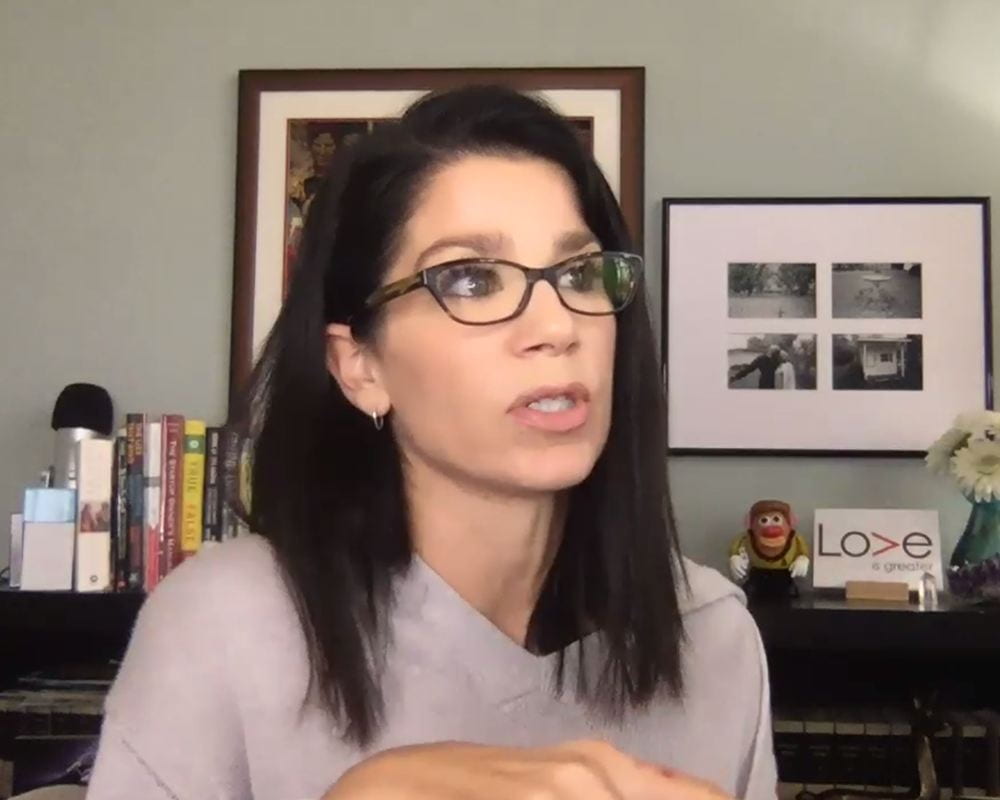Many students come to Perkins to prepare to minister to the faithful. But for an hour in November, Perkins graduate Rachel Roberts (Th.M. ’15) invited them to consider those who espouse no particular faith, in a November 10 Community Hour at Perkins (CHAP) program on “Everything Nones Wish You Knew About Them.”
“Some 90 million Americans identify as ‘Nones,’ and they are redefining what it means to live meaningfully without religion,” she said. “They don’t practice a religion, but most have been influenced by religion.”
Roberts shared her own spiritual journey – growing up in a Christian cult and eventually joining a megachurch as an adult. After a difficult divorce, she returned to Perkins as a single mom of three and graduated in 2015.
Then she had an identity crisis.
“I felt that some of the things I learned at Perkins were not living out in my church experience,” she said. Bible stories understood as metaphorical among scholars, for example, were taught as literal truth at her church.
“It made me feel incongruent,” she said.
In May 2015 Roberts came across Pew Research Center’s Religious Landscape Study, which showed that a growing number — about 25 percent of Americans — identified as “None.” When asked about their religious affiliations, they checked “none of the above.” She realized that she fell into that category, too.
“I’m not anti-religion,” she said. “I’m influenced by all kinds of religions.”
That realization led Roberts to quit her job, write a book (Confessions of an American None: A Credo of Sorts (2020) and launch American None, a website aimed at the 90 million Americans who call themselves Nones. With the tagline, “Where Love is Greater than Labels.”
Roberts says Nones reject both organized religion and labels. As a result, they find themselves in a unique spiritual space — neither religious nor atheistic.
Nones tend to be younger, left of center politically and live in urban centers and/or on the east or west coast, rather than in rural America. Some 69 percent are former Christians. Sociological shifts behind this emerging cohort include the emergence of the information age, and growing concerns for diversity and social justice issues, which often appear to conflict with religious teachings. Many Nones consider themselves “spiritual but not religious.”
“Most Nones don’t have a problem with Jesus or his teachings,” Roberts said. “They have a problem with what happens when you get a bunch of humans together and marry self-interest with religion.”
“Those Nones who choose to walk away from their communities of faith often experience disorientation, grief, and fear of rejection by loved ones,” Roberts said.
“I’ve talked to people who are more afraid of telling their parents they don’t believe that Jesus literally rose from the dead than they were of telling them they were gay,” she said.
Still, Roberts added, Nones feel a need for spirituality when they no longer embrace religious faith, and that’s the conversation that fascinates her. She cited research by Dr. Elizabeth Drescher of Santa Clara University that suggests that Nones instead find meaning through relationships, food, experiences, pets, fitness and giving back to others through volunteerism or philanthropy.
“Living without religion, Nones experience spirituality in simple, everyday living and through connecting with others,” she said. “They are re-inventing what it means to be spiritual beings. However, when faced with crises or difficult life milestones or rites of passages, there is a dearth of spiritual resources for Nones.”
Roberts invited members of the Perkins community to contact her at rachelroberts@americannone.com for further conversation.
“I value thoughts and feedback from my Christian friends,” she said.
